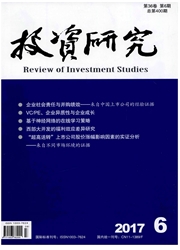

 中文摘要:
中文摘要:
随着技术创新成为企业发展的核心,越来越多的企业意识到,员工的知识、技能和经验是企业获得竞争优势的独特资源。人力资本已成为推动企业发展的原动力。运用2004-2005年中国规模以上工业企业的普查数据,我们将企业的人力资本投资分为一般性人力资本(用员工受教育水平来衡量)和专有性人力资本(用企业对员工的培训投入来衡量),并分析了其对企业绩效的影响。实证结果表明:员工受教育水平对企业绩效具有显著的正向影响;员工培训投入对企业绩效的影响呈"倒U型"关系;员工受教育水平与培训投入间存在负向的交互效应,即员工受教育水平越低,培训投入对绩效的影响越大。此外,我们还发现,在劳动密集度较高的行业中,员工培训投入对企业绩效的影响更大;而在劳动密集度较低的行业中,员工受教育水平对企业绩效的影响更大。
 英文摘要:
英文摘要:
As the technological innovation becomes the vitality of enterprise development, firms are increasingly realizing that, employees' knowledge and skills are the unique resources to gain the competitive advantages. Human capital is becoming the driving force to promote the enterprise development. Accordingly, based on the data of Chinese industrial enterprises, this pa- per examines how human capital investment (including education and training investment) affects the firm performance. The re- suits show that, employees' education has a significantly positive impact on firm performance; an "inverted U" shaped relationship exists between training investment and firm performance. Also, there is a negative interaction between employees' education and training investment. The lower employees' education is, the higher impact training would have on the firm performance. In addition, we also investigate the impact of industry types and find that, in the lower labor-intensive industries, employees' education will have a greater impact on performance, while in the high labor-intensive industries, the effect of training investment will be greater.
 同期刊论文项目
同期刊论文项目
 同项目期刊论文
同项目期刊论文
 期刊信息
期刊信息
